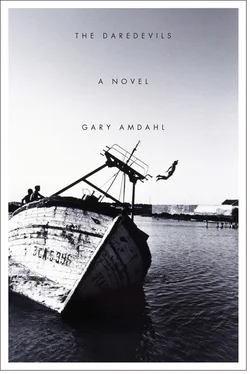White spaces, in the time and confines of the minds of the storyteller and story hearer, were made irregularly and infrequently.
“Our mill was not merely a legendary worker’s paradise; in fact it was famous for its looms — or rather, more precisely, for an innovation in the design of the looms’ flying shuttles: they had lead tips and were ten times as durable as the all-wood shuttles, whose tips cracked and splintered and fell to pieces under the stress of the new high speeds with unacceptable frequency. But before we could get to a loom, we would have to spend several years—‘the best years of our lives,’ I liked to say, making Rosemary laugh — on the drums, working the ‘jumbo exotic carders,’ as they were technically known. There were eleven drums of varying sizes connected by belts: the big central drum was called ‘the swift’ and ran clockwise; two drums about half the size of the swift, ‘the doffer’ and ‘the fancy,’ were high and low at the back of the swift, running counterclockwise. There was a little ‘stripper’ between the fancy and the doffer, and above and below the feeding tray, which was in front of course, where the cotton fibers entered the carder, at tit level, were two little drums called ‘nippers,’ with a little stripper on top of the top nipper. Going up over the swift were four medium-sized drums, two pairs of strippers and ‘workers.’ In the back, below the doffer, was the fly comb, tit level, where the cotton fibers left the carder, again at tit level. I stress this point of the description because we could never let our arms hang, they were always raised from the shoulder and spread. This was a job considered especially suitable, for an unknown or undeclared reason, for little girls, teamed, as often as possible, with their mothers. Rosemary’s ‘mother’ was a devious and secretive harridan who hated Rosemary, and hated me too, again for an unknown or undeclared reason. Confronted with the truth, as she had been at the well by the witches, that harridan was Rosemary’s actual, biological mother, Rosemary would hold up her hand and slowly shake her head: she was a distant relative who had hated Rosemary’s parents because of their interest in unionism, and feared they had passed this interest on to a little girl who clearly had troublemaking on her mind anyway, and for whom she had an unpleasant but unavoidable responsibility. But whatever the cause of the hatred and the nature of the relationship, there was one constant in the acting out of it, and it required two actors and a long-forgotten understanding of who had started it. Rosemary, despite the fact that we were living out the best years of our lives in a worker’s paradise, was deeply disturbed by the monotony and sensory assault of her job — it’s hard for most people nowadays to imagine a child of six or eight or sixteen on the edge of nervous collapse, but not me.”
“Nor me.”
“Yes. The earthquake was hard on you.”
“Easy to make light of it now. You can be callous when you’re high.”
“She would often fall to her knees in exhaustion and misery, or, if she had enough strength and will, would wander away from the drum. The mother would catch her by the arm and yank her to her feet, keeping one hand in her game at the other end of the carder, or, failing to the catch the arm, Rosemary’s hair, sometimes yanking so hard she would snatch Rosemary off her feet entirely, stretching her out like a no-holds-barred wrestler and slamming her to the floor with a thud. But while the floor was not the rumbling, screeching, eternally rotating drum, it was no picnic down there, either. Its warped and clattering boards were coated thickly with oil and grease and mud, sawdust and cotton waste, tobacco juice and tubercular spittle, blood and pus and the dust of our very skins, but it was the only place where a little girl might powder her nose. Given the carefully regulated clockwork mechanisms of the mill’s fundamental movements, we were encouraged to eliminate our waste prior to or after the bells. Company policy stated clearly that no employee would be, indeed could be, allowed to vacate a station for any reason whatsoever — not even to urinate. So Rosemary — and I, later, though not so regularly or with such blasé facility — learned to piss on the floor at her station. The mother would grab her arm as usual, but a sign from Rosemary that urination was underway would almost always result in a loosened grip and a general tolerance. ‘You filthy little beast,’ the mother would chuckle. ‘You are ignorant of the world below,’ piped Rosemary, drawing herself up like an opera star and delivering her lines with a recitative-like eloquence. She was annoyingly precocious and took a great deal of undisguised pleasure in unusual tropes and words dense with multifarious meaning — as did I. It was another one of the ways in which we in effect whistled while we worked. They had to shout to hear each other and really couldn’t make out much of it even when they did, but understood each other well enough, reading lips, remembering, imagining. In spite of the hatred that underlay it, the nervous tension that harried it, and the deafening thunder of the looms above, the constant but irregular banging of the rows of drums and creaking spools and thudding engines, the ordinary remorseless cries of horses and men and clanging bells and piercing shrieks of steam that overwhelmed their conversations, Rosemary and her drum-mother had somehow come to agree that whether or not there was ‘another world below them,’ they could at least argue about it. Somewhat in the manner of a prisoner and guard, they exchanged warm and candid, if not altogether friendly and sympathetic, observations, fanciful hypotheses, hilarious syllogisms, and straw men. Rosemary posited a world no bigger than the mill sunk a mile or so into the earth at the end of something like a mineshaft. It was a utopia in which hard but calm and therefore satisfying work alternated with intellectual seductions and sensual pleasures of the simplest and deepest kind: wind in the trees, water rushing over rocks, hugging, kissing. The people refused to take advantage of each other, and governed themselves with quiet talks and broad deliberations. They grew old very slowly, and death was almost unknown among them, but — and what a big but, I always liked to say at that point — they depended utterly on a magical precipitate, a gentle rain that fell upon them like mercy from their tiny heaven, coursing down their tiny mountains and running swiftly past their tiny mills, an elixir derived solely from the germ-laden phlegm and urine-sodden dust as it percolated down the shaft from the big mill above the ground. When they coughed in their anomalous illnesses, their germs sprayed up at her in turn, in faint puffs, like little angels of mercy. The drum-mother dismissed all this as fairy-tale nonsense, suggesting that whatever they got from the big mill came upon them like plague and flood. It was very likely a flammable liquid as well, igniting infernos where it didn’t drown or cause pustules and lesions to form in the lung, the face, and the genitals. ‘And as for the utopia—!’ ‘You are as ignorant of the world below as you are of this world!’ ‘Dream on, you little nincompoop!’ ‘I shall, allow me to assure you!’ ‘Why would they behave any differently down there than they do up here?’
“‘Because they wish to!’ ‘I do not wish you to speak of it again. You must pay attention to your work or risk a break in your concentration. You might fall behind, your work will pile up, something might snarl or jam or catch, and you will place not only the steady functioning of the line but yourself and your fellows in terrible jeopardy. If the line is destroyed, so are our jobs and consequently our lives and our souls. Yes, it is a sin. God will wonder what is wrong with you. You don’t want God wondering what’s wrong with you, Rosemary, do you understand me? Do you understand me? I will not have you starve to death!’”
Читать дальше












